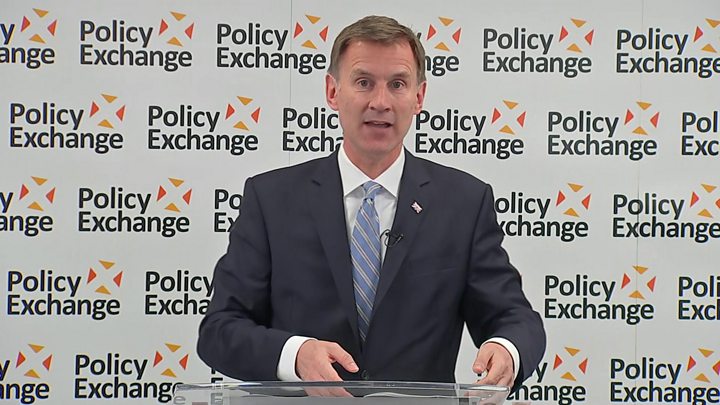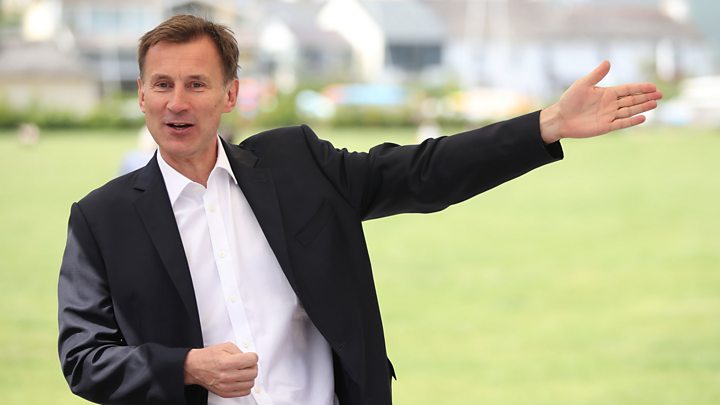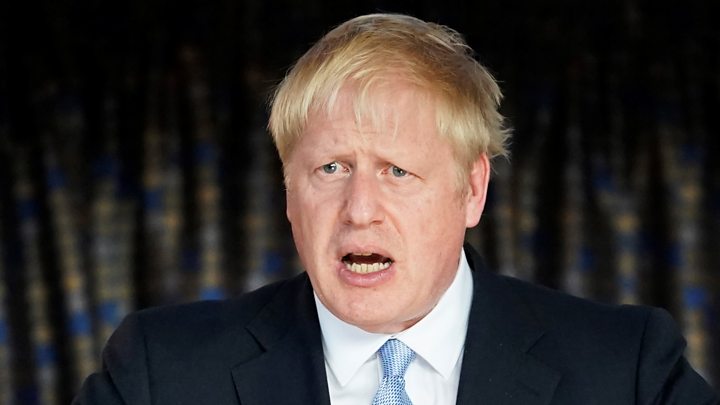Tory leadership: Jeremy Hunt sets 30 September 'no-deal deadline'

Jeremy Hunt has said he will decide by the end of September whether there is a "realistic chance" of reaching a new Brexit deal with the EU.
The Tory leadership contender said he would deliver a provisional "no-deal Brexit budget" in early September and then give the EU three weeks.
He vowed to abandon talks after that if there was no "immediate prospect" of progress and move to a no-deal footing.
His rival Boris Johnson has vowed to leave "come what may" by 31 October.
The Conservative Party's 160,000 members will begin voting next week and Theresa May's successor is expected to be announced on 23 July.
If successful, Mr Hunt said he would "engage" with fellow EU leaders during August, and task a new negotiating team with producing an "alternative exit deal" - including ideas to solve the Irish border issue - to be published by the end of the month.
At the same time, he said preparations for no deal would continue in earnest, and all leave for civil servants at government departments would be cancelled unless he received guarantees that no-deal planning was "on time and on track".
The foreign secretary also warned MPs against attempting to block a no-deal Brexit, warning it could make it harder to get a new agreement by giving the EU "misplaced confidence that we'll give ground".
He added that detailed preparation plans for no deal were needed to make it a "credible threat" to the EU, and give the UK "leverage" in the talks.
In a direct challenge to his leadership rival, he said the chances of a no-deal Brexit were "far from" the million to one odds recently quoted by Boris Johnson, and it would not be possible to deliver it "on a wing and a prayer".
'No deal relief'
A no-deal exit on 31 October remains the default position in UK law after MPs rejected the agreement Theresa May agreed with Brussels three times.
If that does happen, the UK will automatically begin trading with the EU under the basic World Trade Organization (WTO) rules.
Under these rules, the tariffs - the taxes on imported and exported goods - will be different to what the UK currently trades under, which means the cost to farmers to export products could change or they could be affected by competition from abroad.
The National Farmers Union has said British farming will be "damaged" if that happens.

In a speech in London, Mr Hunt said a government led by him would cover the costs of the tariffs that would be imposed on the exports of the farming and fishing industries.
He promised to create a temporary "no deal relief programme" - designed to be similar to US President Donald Trump's promise of £16bn for farmers affected by Chinese tariffs.
"If you're a sheep farmer in Shropshire or a fishermen in Peterhead I have a simple message for you," Mr Hunt said.
"I will mitigate the impact of a no-deal Brexit on you and step in to help smooth those short-term difficulties.
"If we could do it for the bankers in the financial crisis, we can do it for our fisherman, farmers and small businesses now."

Mr Johnson also promised to support the rural community after Brexit during a meeting with farmers in Cumbria last week, insisting farmers "should be assured that we will support the rural community, with price support, efficiency payments, whatever".
Meanwhile, one of his leading backers, Health Secretary Matt Hancock, told the Times the days of public sector "pay freezes" under Theresa May and David Cameron would be over if Mr Johnson was elected.
Mr Hancock said: "People in the public sector need to be properly rewarded for the brilliant job they do."
"Now that there's money available, we need to show the public sector some love," he added.
But during a campaign visit in Kent on Monday, Mr Johnson declined to make a concrete pledge on public sector pay, saying only that remuneration should be "decent".
Magic money tree?
Analysis: Norman Smith, BBC assistant political editor
It does all raise the question - where on earth is the cash for all these pledges going to come from? Have Mr Johnson and Mr Hunt discovered the proverbial "magic money tree"?
No, instead they're looking to dip into the chancellor's back pocket.
Philip Hammond has suggested he has £26bn of what is called "headroom" in his current fiscal forecasts - basically, scope to borrow that much more - and Mr Johnson and Mr Hunt are saying they'd do just that.
To many Tories this sits at odds with the thrust of with Tory thinking.
The other thing which makes the spending pledges slightly more dubious is that Mr Hammond says, "Ok, I've got this headroom - but if we come out with no deal then all the money is going to have to be put into propping up the economy and getting us through that."
Both leadership contenders have unveiled plans to cut taxes and spend more, designed to win support for their candidacies, but questions have been raised about how they would pay for the pledges.
Earlier in the campaign, Mr Johnson said he wanted to raise the threshold for the higher rate of income tax, predicting this would stimulate the economy, and increase government revenues.
He has said he would partially fund some of his plans from "fiscal headroom" carved out by current Chancellor Philip Hammond in his current spending plans.
This amount - estimated at £26.6bn at the spring statement - is an additional amount the UK could borrow without breaking self-imposed limits on government borrowing.
The figure is based on projections that assume the UK left the European Union with a deal, but Mr Hammond has warned that handling a no-deal exit would absorb that potential cash.
"Either we leave with no deal or we preserve our future fiscal space - we cannot do both", he said last month, and on Monday, he reiterated that message.
Sources close to Mr Hunt have also suggested he would use this "headroom" to partially fund his pledge to boost defence spending by £15bn over the next five years.
But economist Paul Johnson, from think thank the Institute for Fiscal Studies, pointed out that the £26.6bn is "a one-year target so can't fund permanent tax cuts/spending increases".
Speaking on Sunday, Mr Johnson said he would be prepared to borrow more to finance "great objectives" in his spending plan, whilst keeping "fiscal responsibility".
He told Sky News there was up to £25bn "available" in the short term, due to the improved state of the public finances, which "we intend to use" on education, policing and broadband rather than reducing the deficit.